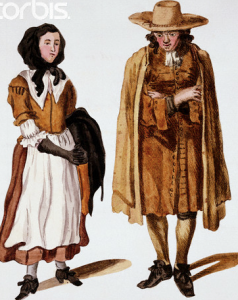Friends made a most profound affect on the course of American history. The first Quaker missionaries arrived on America’s shores in 1656, one hundred and twenty years before the signing of the Declaration of Independence, Mary Fisher and Ann Austin landed at Boston. Â Please note these women traveled alone as missionaries, definitely not the norm for that time period.
Quaker women have always been treated as equals. Â If you have looked at historical pictures of meetings you will note that the women sat on one side and the men on the other. Â Most people assume it was because women weren’t equal to men, but actually the opposite is true. Â Women sat by themselves so that their husbands couldn’t keep them from speaking. Â Historically many Quaker women have been leaders, ministers, missionaries, businesswomen and more.
Friends were welcomed in Rhode Island which was founded as a haven from the intolerance of Puritan Massachusetts. So overwhelming was the response there that at one time half of the population were Friends, and the colony elected Quaker governors for thirty-six consecutive terms–more than a century.
William Penn landed in his colony on the good ship “Welcome” in 1682. He met with the Indians under the great elm at Shackamason, the ancient meeting place of the tribes and made friends with them. He purchased land from them at a fair price and concluded a treaty with them that was agreeable to all. Â Believe it or not, Â this was the only Indian treaty that was never broken!
In 1746 John Woolman undertook his first long journey into Pennsylvania and the South and quietly tried to persuade the heads of households with whom he was staying that they were hurting themselves and their families by keeping slaves. He did not argue. He only shared the insights that he had been given in a gentle and loving way. He was as concerned for the well being of the slaveholder as he was for the well being of the slaves. In the next twenty-five years he traveled up and down the East Coast from New England to the Carolinas in the pursuit of his mission. Within a few years after his death in 1772 all Friends in America had freed their slaves. They were the first Christian group on these shores to do so.
Quakers were very active in the underground railroad and worked diligently to end slavery in all forms.
In the summer of 1840 Lucretia Mott was excluded for the anti-slavery Convention in London because she was a woman. In 1848 she joined with a few other women in calling the first women’s rights convention at Seneca Falls, New York. Friends have always believed in the equality of sexes and have given equal place to women as ministers in their churches.
In England, the Quaker Rowntree and Cadbury families ventured into the chocolate and cocoa business because they saw hot chocolate as a possible alternative to alcoholic beverages. In Philadelphia, a Quaker grocer named Joseph Hires developed a concoction he came to call Root Beer in the hope that his employees and others might come to drink it instead of alcohol.
n 1768, a Quaker doctor, Thomas Dimsdale, was invited to Russia by Empress Catherine II to introduce vaccination against smallpox. Another Quaker doctor, Joseph Lister, is regarded as the father of antiseptic surgery. Today a widely used product in the United States bears his last name.
Unprogrammed Liberal Friends Meetings were one of the first religious groups to allow gay marriage and have been welcoming gays for many years.
